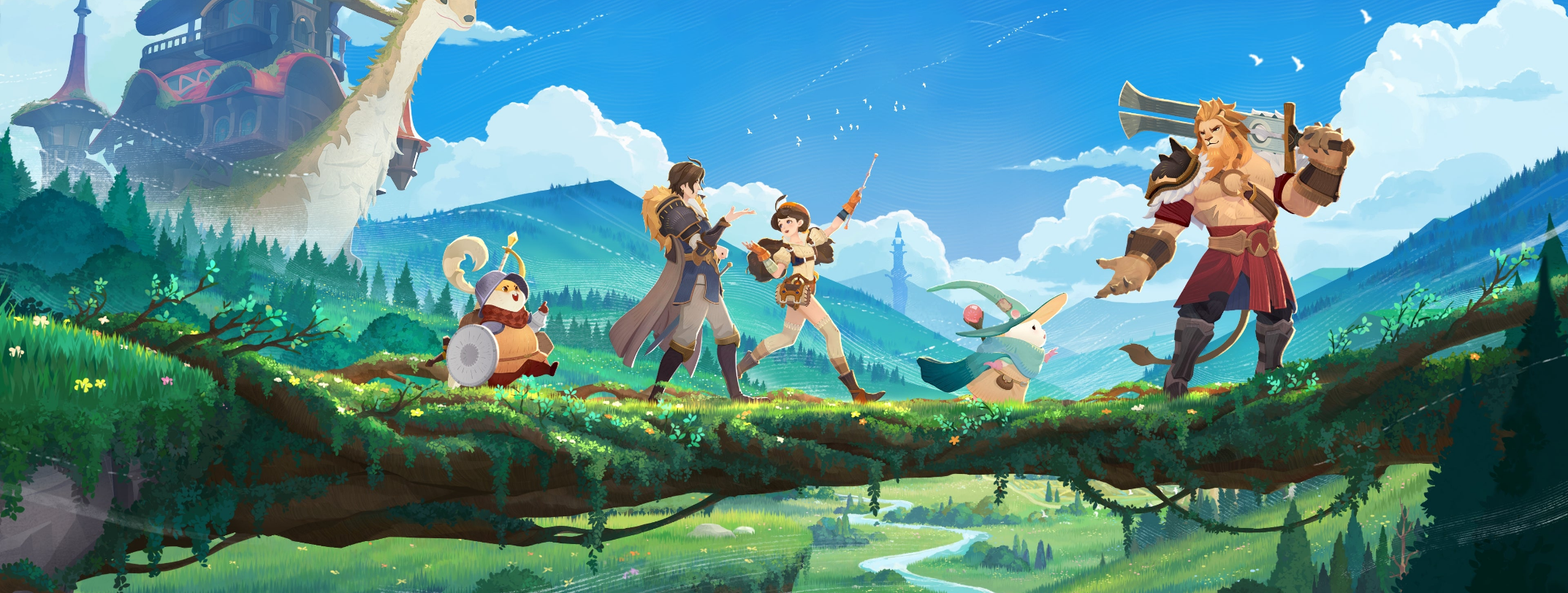Trends come and go, but some of this year’s biggest mobile gaming trends have staying power, which means we’ll see more refinement rather than radical innovation. While many of the trends we’ve highlighted before are as prevalent as ever, they’ve grown bigger and better throughout 2024.
Look at live events, for example. Their popularity persists but with a noticeable leap in production values and the emergence of more intricate monetization strategies, such as paywalled events and additional rewards tracks in battle passes.
Perhaps the biggest addition for players is the breadth of new titles on offer, with a number of anime-inspired RPGs (including Zenless Zone Zero and Wuthering Waves) performing well not just in Japan, but also doing ok in the West. But who says that mobile players should have all the fun? An increasing number of titles are also allowing players to take their adventures across different hardware with crossplay support on PC and console.
But enough with the introductions. Join us below as we explore the biggest trends in mobile this year. If you’re strapped for time, you can jump to the most relevant sections using the links below:
- The popularity of LiveOps continues
- Emerging types of hybridization
- Asian publishers’ growing RPG presence in Western markets
- Rise of crossplay
- Major mobile games on the horizon to watch out for
The popularity of LiveOps continues
If there’s one thing that seems consistent across the top-grossing mobile titles, it’s the continued dependence on LiveOps to drive player engagement. While that works exceptionally well for existing titles, it’s made it challenging for newer titles to break through amid all the well-established content machines. That’s why it’s so important for mobile developers to keep up to date with the biggest trends in LiveOps, including the following:
Enhanced production values
A few years ago, you might have been able to get away with launching a simple event where players just have to complete a basic gameplay task to unlock rewards – but that doesn’t cut it in 2024. Today’s live events boast high-quality production values and often leverage multiple gameplay mechanics.
For example, many casual titles now incorporate minigame events to support their core gameplay loop. How this works in practice is pretty simple: users play the usual primary gameplay mode, which in turn generates “energy” that can be used to participate in a separate minigame that functions completely differently from the rest of the game that may even have its own IAP offering or dedicated store.
You can see this in action in titles like Gossip Harbor and Royal Match, both of which feature a minigame event inspired by the viral hit Wordle. Getting to experience something new and unique in this way creates a highly engaging loop that encourages players to return far more than traditional challenges or quests otherwise would.
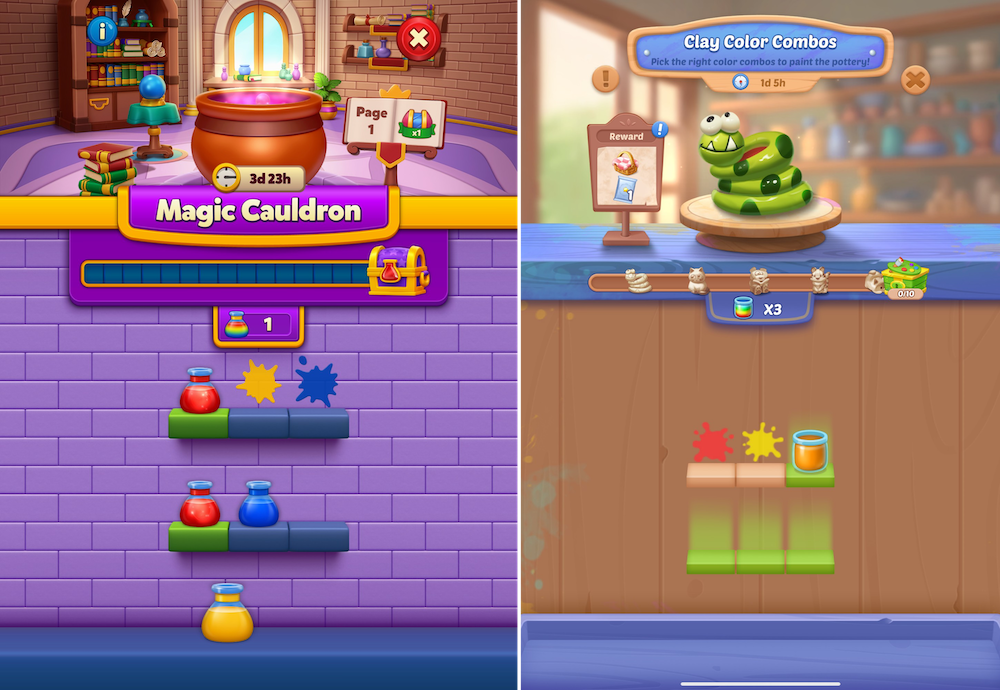
Boosts and other new monetization methods
Innovating in LiveOps isn’t just about tweaking gameplay mechanics; many developers are experimenting with how they monetize events. A growing number of titles are starting to incorporate premium reward tracks into their events as special battle passes. This is like having a miniature battle pass that you can only progress through by participating in an event.
In addition, many games now allow players to purchase a premium boost that supercharges progression through the event. These boosts usually take the form of a specific customization option. For instance, if you’re playing the event using a specific skin or character, you might earn twice the amount of experience or in-game currency.
The rise of event paywalls
That’s not the only monetization trend we’ve seen that’s reminiscent of PC and console games. A select few mobile games are now locking premium content behind a paywall in a move not too dissimilar from downloadable content (DLC) or a classic PC expansion.
Let’s look at some examples:
- Players were required to purchase a specific premium building (costing $50) to participate in one of Last Fortress’ recent minigame events.
- State of Survival’s Resident Evil collaboration event featured a unique quest line that players could only start after acquiring a specific character from a gacha. Players received one free pull daily, but subsequent attempts required premium currency.
Free Fire employed a “top-up” event system which required players to purchase a specific amount of premium currency to unlock a wider selection of features.
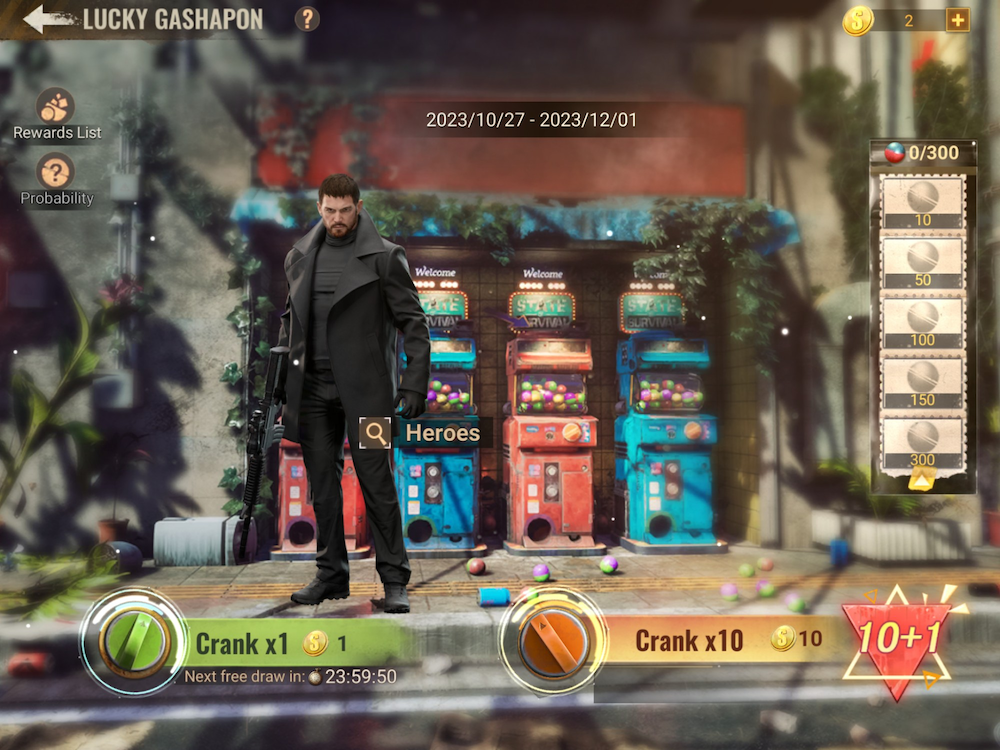
Monetization: Hyper casual turns hybrid casual
As noted in Liftoff’s 2024 Casual Gaming Apps report, while hyper casual titles remain popular, their numbers are slowly falling year over year. As a result, many hyper casual developers have been experimenting with hybrid monetization models — taking their simple, highly marketable gameplay concepts and enhancing their revenue-driving capabilities with a comprehensive ad strategy and IAP offering more befitting the casual and midcore genres.
At the same time, these titles have also built on their initial success through the addition of new content and live events, keeping users engaged and opening up new opportunities to drive revenue.
These hybrid monetized titles are particularly prevalent in the puzzle genre. During the first six months of 2024, several hybrid casual puzzle titles have emerged seemingly out of nowhere and infiltrated the top 200 grossing charts, including:
- Screw Jam – In this title, players have to remove a series of blocks by correctly identifying and removing certain screws.
- Twisted Tangle – As the name suggests, this game’s puzzles see players trying to figure out the correct order to untangle a bunch of interlocking ropes and chords. This title has been particularly successful, holding its place in the top 200 grossing since its release in December 2024.
- Hexa Sort: To progress in this game, players must sort out different-colored blocks.
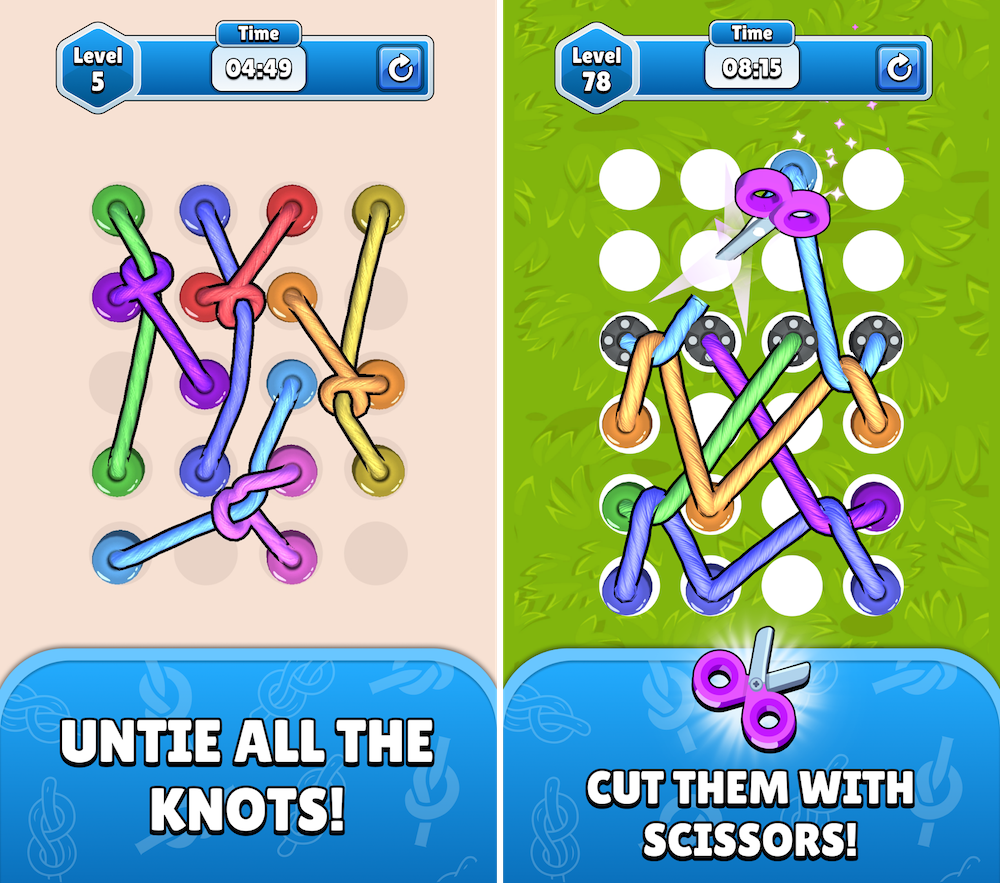
One of the reasons these titles may be striking a chord with many players is their level of variety. Traditionally, most games in the puzzle genre don’t differentiate from one another, meaning there’s little reason for players to change things up once they’ve found a title they like. If you’ve tried out one match3 or merge game, it wouldn’t be completely outrageous to say that you’ve played them all, whereas each new hybrid casual puzzle title brings something new to the table that warrants a download.
That being said, while these hybrid puzzlers differ in their core gameplay, they have much in common regarding monetization. Most of these titles rely on in-app purchases to bring in revenue. For example, players might pay for extra time to complete a complex puzzle, make additional moves, or gain access to valuable items.
It’s also worth noting that most hybrid casual games offer players a steady stream of new content through a live events framework. This enables them to retain players for significantly longer than traditional puzzle titles, which are often very one-and-done.
A quick note on hybridization through gameplay
Admittedly, hybridization isn’t anything new for the mobile market. For some time now, more and more titles have increasingly been looking at wider genres and other titles to inspire new gameplay ideas that substantially differ from their core offering. This trend has continued to grow in prominence over time, with many popular titles using minigames (think smaller games, built within games) to incorporate wildly different gameplay ideas into the mix without disrupting the primary systems.
One notable example of this in practice is the growing prominence of Vampire Survivors-like minigames, with State of Survival, Diablo: Immortal, and League of Legends (PC) all hopping on board. These minigames play much like the indie hit that inspired them, with the player (or a group of players) battling through an onslaught of enemies by simply moving their character, which fires automatically.
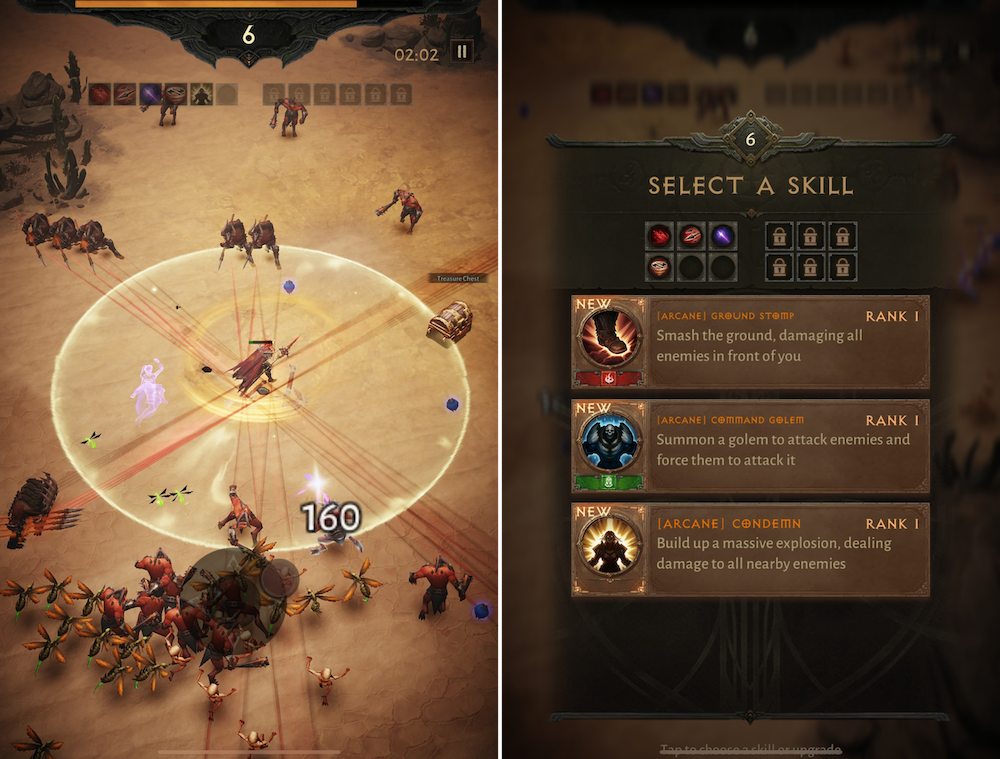
Asian publishers’ growing RPG presence in Western markets
If you’ve been keeping up with our regular analyst bulletins, or even just the hottest mobile games generally, you will likely have noticed a sudden burst of anime-themed RPGs that are topping the charts in the West. At the time of writing, there are over ten titles falling under this category in the US iOS Top 200 grossing chart, several of which have only launched during the course of 2024.
While we’ve seen a few titles in this area perform well in the West—such as Dragon Ball Dokkan Battle (2015), Fate/Grand Order (2018), and Dragon Ball Legends (2018), all of which consistently rank highly in the top grossing 200—it’s unusual to see multiple new titles performing so well back-to-back. Let’s look at some of the heavy-hitters:
AFK Journey
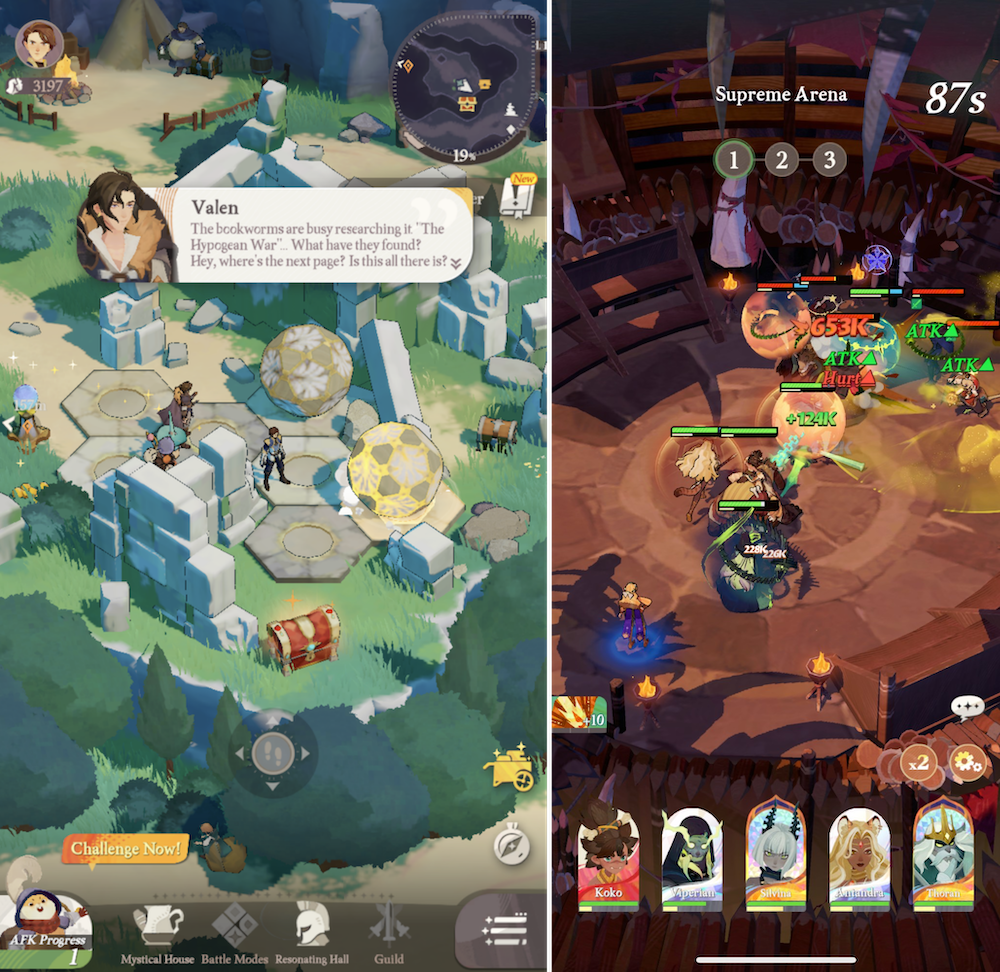
AFK Journey is a spin-off turned sequel to the highly successful AFK arena, which launched in March 2024. The game had a very strong launch in the US, peaking at #15 in April’s top-grossing chart, and second in downloads on the US iOS market. It’s since slipped further down the ranks but is continuing to hold its place among the top 200.
Much like its predecessor, AFK Journey is an idle RPG—albeit with a few twists of its own. The game is made up of an auto-battle core and features crossplay with PC, where players can also access an external webstore. AFK Journey has a large number of heroes players can choose from, but users only need to level up five characters to progress. Any remaining heroes automatically catch up to the fifth strongest character, making it easy to switch out your team and mix up the gameplay.
AFK Journey offers players a lot of variety, with expansive areas to explore, engaging puzzles, and strategic battles, which aids retention as it means there’s always something new to see and do. Its presentation is also exceptionally high-quality, with a unique hand-drawn art style and fully voiced cutscenes.
Solo Leveling: Arise
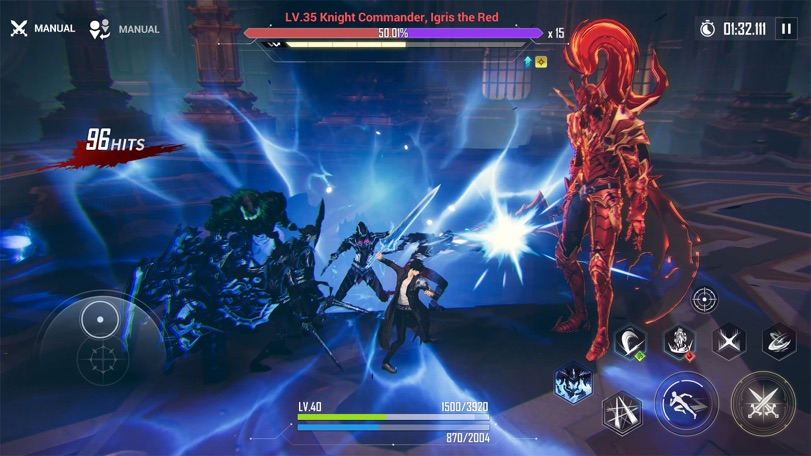
Another anime-esque newcomer that has been performing well in the US is Solo Leveling: Arise, which launched in May earlier this year on mobile and PC. The game is based on a Korean webtoon and debuted in the top 10 in the US and Japan.
Gameplay-wise, Solo Leveling: Arise is a classic action RPG based around character collection that has a few unique quirks. For example, the main character’s leveling system allows players to allocate points to desired stats after each level-up. The game also features two distinct combat modes, one exclusively for the main character and another where only side characters can be used.
Since launch, the game has fallen down the US ranks. While this may look alarming, this is actually a fairly common pattern for character collection-focused titles like this. Usually, these titles see large revenue spikes with each new update as players rush to pull new characters available through gacha, with a sharp drop shortly after till the next new addition lands.
That being said, the performance drop for Solo Levelling: Arise has been slower than usual, suggesting that it may be following a slightly different trajectory. Only time will tell if the slow decline continues, or if it will be able to find a solid baseline among the top 200.
Wuthering Waves
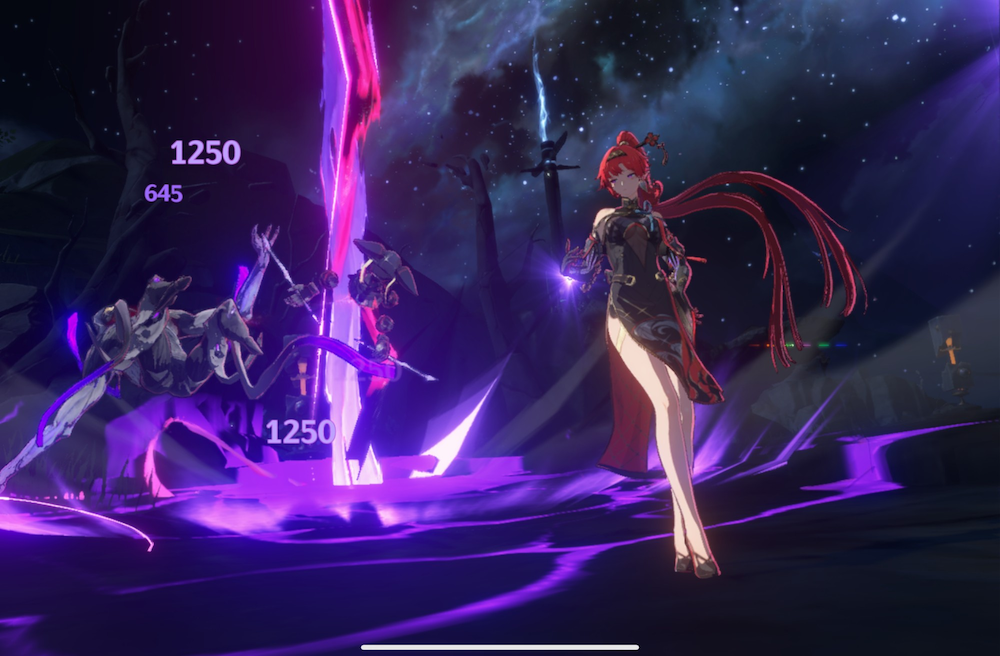
Next up is Wuthering Waves, which is a straight-up competitor against Genshin Impact, right down to its open-world design philosophy, role-playing elements, emphasis on character collection, and art style.
However, the game does have some unique mechanics that set it apart. For example, Wuthering Waves has a Pokémon-style monster-collecting feature (which also doubles as the game’s artifact system) where players can capture enemies and use them as skills. The combat also has a lot of depth, with each character offering distinctive gameplay mechanics. It also features crossplay with PC and PS5.
Yet again, the game made a substantial impact on its launch earlier this year, climbing to the very top spot in downloads in both the US and Japan. However, much like the other titles, it fell back down the ranks once the initial hype subsided.
That being said, the title appears to follow a similar pattern to Genshin Impact in that its performance fluctuates in line with major content updates (albeit to a lesser extent than MiHoYo’s immensely popular title). When Wuthering Waves’ first major content update dropped on 27 June, the game saw a 300% increase in daily revenue in the US (and a more than 3000% increase in Japan).
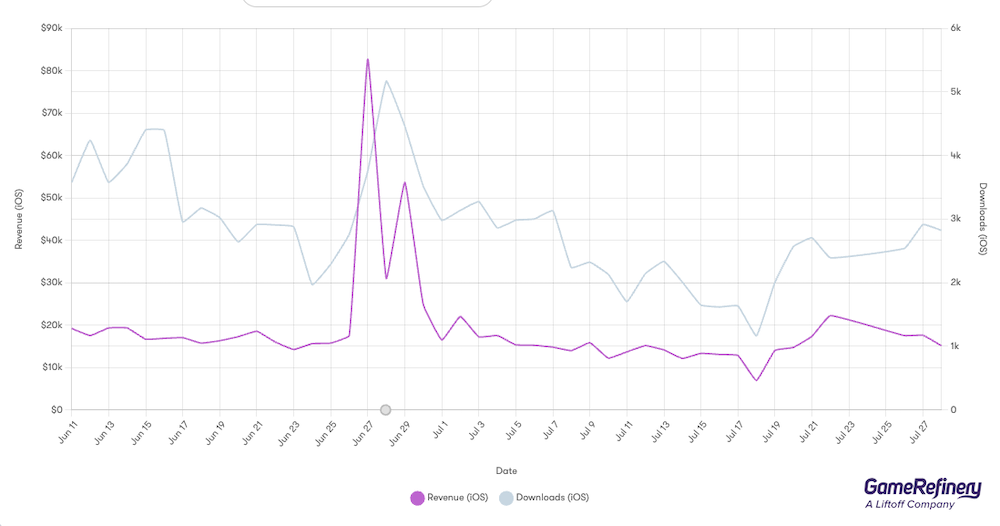
Zenless Zone Zero
Speaking of Genshin Impact, we’d be amiss if we didn’t mention the latest addition to the mobile market from MiHoYo. By putting the focus on flashy, action-packed battles through linear areas, Zenless Zone Zero manages to carve out its own identity against Genshin Impact’s open world and the turn-based affairs of Honkai: Star Rail – even if it does look largely similar due to the three titles shared cartoonish art style.

Given the monumental success of MiHoYo’s other titles, it should be no surprise that Zenless Zone Zero drew in some major numbers. Within 72 hours of its release on 4 July, the title had already passed 50 million downloads. Revenue-wise, the title is less impressive, performing well below that of Genshin Impact, although it still ranks among the top 100 grossing titles. It’s worth noting that all three of MiHoYo’s titles feature crossplay with PC and console, which may skew these figures to some extent given that players may be spending money on other platforms.
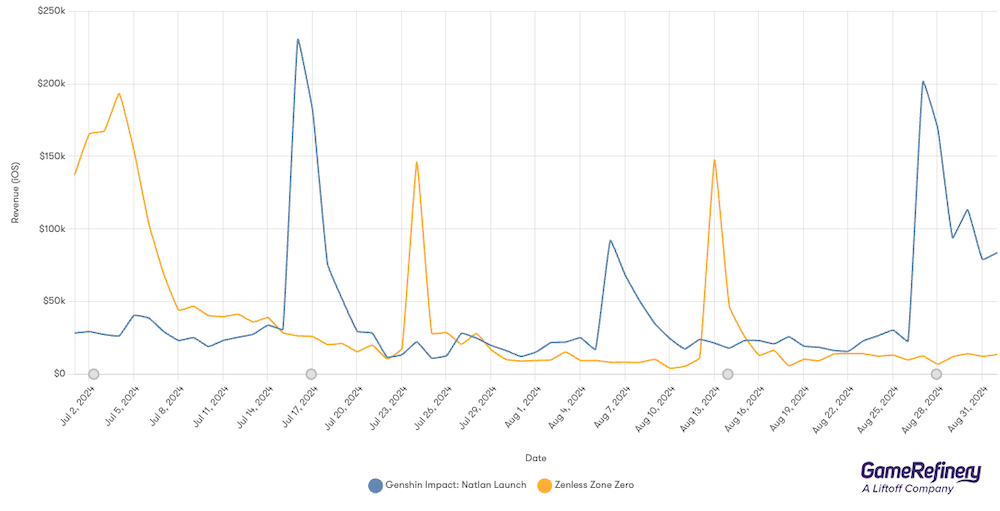
Rise of crossplay
By allowing players to party up with their friends regardless of their hardware, games with crossplay can grow massive communities that span the entire gaming ecosystem. They also allow developers to bypass the costly store fees on iOS and Android, as players can purchase in-game items and currencies via a different platform or a dedicated web store.
Crossplay games arguably make playing more accessible too, as there’s less of a requirement to access costly hardware. If you don’t have a console or gaming PC, you can simply join your friends using your phone. Crossplay games also allow all players to take their gaming wherever they please. They can enjoy the big-screen experience at home and then continue the adventure right where they left off while traveling to work, sitting on a lunch break, and so forth.
We’ve already mentioned a few of the biggest crossplay mobile titles that were recently released earlier in this blog. Zenless Zone Zero, Wuthering Waves, and Solo Levelling: Arise are all available to play on PC, with the first two also on PlayStation consoles. Other examples include Zynga’s Star Wars Hunters (Switch and iOS/Android), Sword of Convallaria (PC and iOS/Android), and Stumble Guys — which only came to console earlier this year.

The one drawback to these crossplay games is that they can be much more expensive to create than a standard mobile game. For one, these games must offer PC and console players an experience that works on a bigger screen, meaning they sometimes have higher production values than you’d typically expect from a mobile title. At the same time, the developers also need to be able to downsize that experience so it works as intended on less hardware.
We can’t forget about the demands of maintaining a LiveOps pipeline, too. Developers need to release expansive new content updates every month or risk losing their players’ interest to competitors. With all that in mind, it’s hardly surprising that Genshin Impact is on track to become the most expensive video game of all time, costing upwards of $200 million each year to maintain.
A note on Call of Duty Warzone and cross-progression
One notable title we have yet to touch on that supports crossplay is Call of Duty: Warzone Mobile, which is compatible with PC and console—at least, sort of. Activision’s battle royale shooter is a unique example of crossplay in that it only offers cross-progression. This means that progress made in the game’s mobile version, such as a player’s weapon collection and battle pass progress, carries over to PC and console.
However, mobile players cannot currently join a game with users on other platforms, although iOS and Android users can play side-by-side. Why is this the case? Activision states on Call of Duty: Warzone Mobile’s website that the game needs to “feel well-tuned, natural, and intuitive on handheld devices” and that full crossplay isn’t supported to “avoid any imbalance” with other platforms.
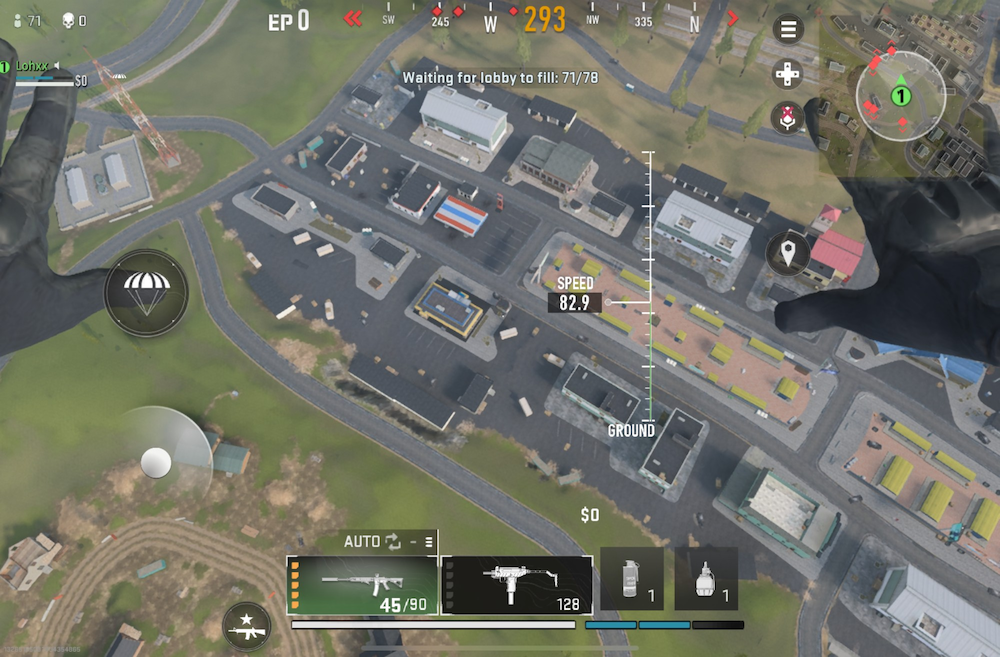
Many first-person shooters like Call of Duty revolve around lightning-fast firefights that depend on quick reflexes and accuracy to rise to the top of the competition. That’s a lot easier to pull off using a controller or a keyboard and mouse than it is using a touchscreen, perhaps so much so that Activision’s early playtests showed it was simply unfair to put mobile players head-to-head with users on PC and console.
Whether this was the right or wrong reason remains to be seen, especially given that the game has disappointed performance-wise — driving significantly lower numbers than that of its predecessor, Call of Duty: Mobile. Either way, it highlights the importance of considering how your game will be controlled on different platforms, especially in titles such as this, which revolve around highly competitive multiplayer.
Keep a lookout for these mobile titles

From popular LiveOps trends to costly crossplay and anime RPGs, there’s a lot to wrap your head around to fully understand what’s popular with mobile players. But that’s far from everything. Here are a few other notable titles coming in the near future that are worth keeping on your radar.
- Fading City & Earth Revival: Fading City is a survival MMO from Netease that’s already available in China but is due to launch worldwide in the near future. It’s notable for its uncanny resemblance to Naughty Dog’s The Last of Us. Similarly, Earth Revival from NuVerse is reminiscent of EA and Bioware’s Mass Effect. It shows that if you have a major console franchise and don’t pursue mobile, you risk someone doing it for you.
- Racing Master: This new racing title from NetEase and Codemasters was released last Summer in China, where it’s been performing relatively well. It strongly focuses on a story-based carrier mode and offers plenty of car customization options. Racing games have struggled to make much impact in the West on mobile, but it remains to be seen if this one can buck that trend when it launches worldwide later this year.
- Royal Kingdom: This spiritual successor to Dream Games’ super hit Royal Match is finally expected to be fully released later this year after a long soft launch period. It has a similar cartoonish Royal-theme to its predecessor, and the same swapping match3 core mechanics. The main difference is that Kingdom changes the perspective change from room to kingdom map on the construction meta, and allows players to execute “light competitive” attacks on other players.
- Project Mugen: This new RPG from Hangzhou and Montreal Naked Rain seems to be very similar to Zenless Zone Zero. Both of these games focus on urban “street fashion,” which seems to be gaining traction in Japan (and potentially China) as a recurring theme. It’s set to launch later this year on mobile, PC and PS5.
- Pokemon Trading Card Pocket: The TCG market will likely get a major shakeup in the near future as a mobile version of the Pokemon trading card game is set for release at the end of October. There’s currently very little information on hand about the title, but it’s expected to play similarly to how the card game works in real life.
- Playrix’s next match-3 title: Playrix is one of the top mobile studios for the match3 genre, having had great success with the Scapes series. At the time of writing, the studio has four new titles in soft launch: Aqua Match, Austin’s Odyssey, Roomscapes, and Familyscapes. While nothing has been confirmed, it’s only a matter of time before one generates strong enough metrics to release fully.
- Assassin’s Creed Jade: Ubisoft has previously attempted to bring this major single-player franchise to mobile, but this is the first time the studio has gone all out with a full-fledged RPG. Given that the PC and console titles are paid for with a one-time fee, this one is worth keeping an eye on to see how it approaches monetization without alienating the core fanbase. It was originally expected to land later this year but has since been delayed sometime into 2025.
If you’d like to learn more about the biggest trends in mobile gaming this year, check out Episode 53 and Episode 57 of the Mobile Games Playbook.

